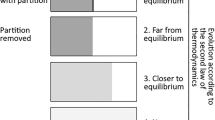Abstract
We introduce a simple model for so-called spin-echo experiments. We show that the model is a mincing system. On the basis of this model we study fine-grained entropy and coarse-grained entropy descriptions of these experiments. The coarse-grained description is shown to be unable to provide an explanation of the echo signals, as a result of the way in which it ignores dynamically generated correlations. This conclusion is extended to the general debate on the foundations of statistical mechanics. We emphasize the need for an appropriate mechanism to explain the gradual suppression over time of the correlations in a thermodynamic system. We argue that such a mechanism can only be provided by the interventionist approach, in which the interaction of the system with its environment is taken into account. Irreversible behavior is then seen to arise not as a result of limited measurement accuracy , but as a result of the fact that thermodynamic systems are limited systems which interact with their environment. A detailed discussion is given of recent objections to the interventionist approach in the literature.
Similar content being viewed by others
REFERENCES
J. W. Gibbs, Elementary Principles in Statistical Mechanics (original edition, 1902; Dover, New York, 1960).
R. C. Tolman, The Principles of Statistical Mechanics (Oxford University Press, Oxford, 1938).
P. Ehrenfest and T. Ehrenfest, Encykl. Math. Wiss. 4(32) (1911) [English translation: The Conceptual Foundations of the Statistical Approach in Mechanics (Cornell University Press, Ithaca, 1959).
I. E. Farquhar, Ergodic Theory in Statistical Mechanics (Wiley Interscience, New York, 1964).
P. T. Landsberg, Thermodynamics and Statistical Mechanics (Oxford University Press, Oxford, 1978).
O. Penrose, Foundations of Statistical Mechanics (Pergamon, Oxford, 1970).
J. Bricmont, “Science of chaos or chaos in science?,” in The Flight from Science and Reason, New York Acad. Sci. Ann. 775, 131 (1996).
J. L. Lebowitz, Phys. Today 46, 32 (1994). Replies in Phys. Today 47, 113 (1994).
E. L. Hahn, Phys. Rev. 80, 580 (1950).
E. L. Hahn, Phys. Rev. 88, 1070 (1952).
W. K. Rhim, A. Pines, and J. S. Waugh, Phys. Rev. B 3, 684 (1971).
E. L. Hahn, Phys. Today 6, 4 (1953).
K. G. Denbigh and J. S. Denbigh, Entropy in Relation to Incomplete Knowledge (Cambridge University Press, Cambridge, 1985).
J. M. Blatt, Prog. Theor. Phys. 22, 745 (1959).
J. E. Mayer and M. G. Mayer, Statistical Mechanics (Wiley, New York, 1977).
I. Prigogine, C. George, F. Henin, and L. Rosenfeld, Chem. Scr. 4, 5 (1973).
L. Sklar, Physics and Chance (Cambridge University Press, Cambridge, 1993).
P. G. Bergmann and J. L. Lebowitz, Phys. Rev. 99, 578 (1955).
O. Penrose, Rep. Prog. Phys. 42, 1937 (1979).
R. Penrose, “Singularities and time-asymmetry,” in General Relativity. An Einstein Centenary Survey, S. W. Hawking and W. Israel, eds. (Cambridge University Press, Cambridge, 1979).
S. W. Hawking, Phys. Rev. D 32, 2489 (1985).
Rights and permissions
About this article
Cite this article
Ridderbos, T.M., Redhead, M.L.G. The Spin-Echo Experiments and the Second Law of Thermodynamics. Foundations of Physics 28, 1237–1270 (1998). https://doi.org/10.1023/A:1018870725369
Issue Date:
DOI: https://doi.org/10.1023/A:1018870725369




